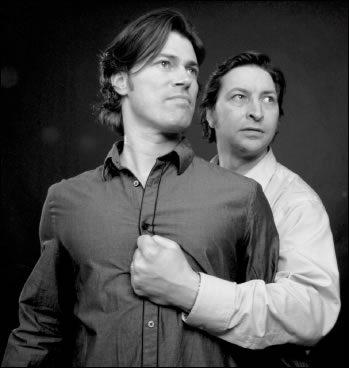BY JERRY TALLMER
Two actors, in modern attire, portray crucial clash
Was this the face that launch’d a thousand ships,
And burnt the topless towers Ilium?
Helen, that is, daughter of Zeus, an Olympus-class beauty, stolen away from husband Menelaos of Greece by Paris, spoiled playboy son of old King Priam of Troy.
“No,” says “Kings” director James Milton — revoking Marlowe’s 500-year-old poetic license, “Helen was just an excuse” for the huge disastrous assault on Priam’s walled stronghold, and those thousand warships sailing toward Ilium were actually full of ravenous Greeks “hungry for Trojan land, for Trojan property.”
And oh yes, hungry also for Trojan women — another form of pirated property, as serviceable and disposable as paper cups or Kleenex. Women as bargaining chips. Of so little actual human value that, in British poet Christopher Logue’s startlingly tough reworking of Homer’s Iliad (adapted for the stage by Jim Milton), the word for “woman” is always merely a flat, jarring “she.” Like this, in the crucial clash over sexual booty between those two great egomaniac Greek heroes, Agamemnon and Achilles:
….Until Achilles said:
‘Dear sir, where shall we get this she?
There is no pool.
We land. We fight. We kill. We load. And then —
After your firstlings — we allot.
We do not ask things back’.
‘Boy Achilles,’ Agamemnon said,
‘I do not ask at all.
Myself un-she’d and in the bed furs, thine?
Ditchmud!’
“Basically,” says Milton, “this section is a prelude to the big fight between Agamemnon and Achilles. Except that the gods can’t kill Agamemnon yet because he has to die at home in the bathtub, murdered by his wife Clytemnestra and her boyfriend. Leaving Achilles to sulk alone in his tent.”
In that era, Milton reminds us, “Rape was so common as to be hardly worth mentioning. In fact I had to tone down some passages, the language was so offensive.
“Greece was then still a tribal society, and each tribe had its own king. One thinks of the ancient Greeks as the people who built the Parthenon and all that. These were not those Greeks. My job was to make the best possible stage show out of this very long poem.”
Here, for laughter, is a thumbnail portrait of one such tribal king: Zeus, king of the gods, talking:
Priam of fountained Troy,
A stallion man — once taken for myself Who serviced 50 strapping wives from 50 towns,
Without complaint — to unify my Ilium…
New York will get a rare slap in the face jolt of Homer-via-Logue-via-Milton from “Kings. “It is considered important enough for three poetry-minded theater companies — the Handcart Ensemble, the Verse Theater Manhattan and the WorkShop — to join together in its presentation. Important enough, too, for hard-hitting Logue (born 1926 in Portsmouth, Hampshire) to have been working on this Variations on a Theme by Homer for going on 50 years now.
Playing all the roles, in modern everyday attire, are actors Dana Watkins and J. Eric Cook.
There are all sorts of slaps in the face. Here is one of the more enjoyable ones:
[Achilles still talking]
‘Well then, my lord,
You change the terms, I change the tense.
Let is be was. Was the day on which
You lead your Greeks, necklaced with spoil,
Capering along the road that tops Troy’s wall
Because you cannot take that wall without me.
Me. Peleus’ son.
Before tomorrow, I sail home. ‘
Silence.
Reverse the shot.
The kicker, of course, is in that throwaway last line, as if on a movie set, an anachronism if ever there was one.
“But everyone will immediately know exactly what is meant,” says Milton. Though “Kings” was and is written as a poem, not a play, Logue has also done a number of film and television scripts and was one of the poets commissioned by the BBC in the 1950s to reinvent the Iliad in their own style.
“Kings” is but one of four linked works intended to be read as books. The other three are “War Music,” “The Husbands” and “All Day Permanent Red.” Logue — who is not afraid of rewriting–has altered and republished several of them.
What kind of fellow is he, anyway, this Christopher Logue?
“Well, he’s not tall,” says Milton, who is quite lean and tall indeed. “He’s kind of stocky. Very imposing, very gregarious and social.
“You would kind of describe him as a bad boy anti-establishment character. In the army he did two years in the stockade. Which I don’t think did much to improve his mood.
“One of his good friends is Ken Russell, another Bad Boy; they tend to clump together.” Logue wrote “Savage Messiah” for flamboyant motion picture director Russell, and played Cardinal Richelieu in Russell’s 1971 “The Devils.”
Milton took “War Music” on a two-week tour of British universities with all roles, of whatever gender, played by three actresses. Logue came to see it — “and I think he loved it.”
On a tiny stage at the Blue Heron, here in New York on East 24th Street, Wilson in 2000 introduced America to Logue’s “Kings” and had just remounted it at a somewhat larger Off-Broadway venue “when world events intervened.”
That is to say: 9/11/2001. Topless towers indeed.
But where was our Achilles?





























